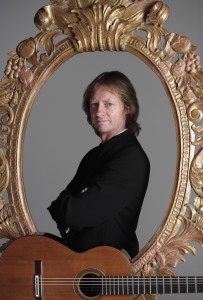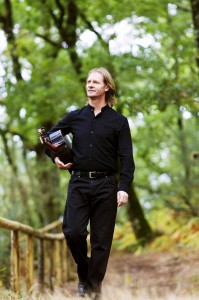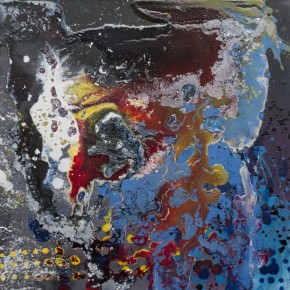David Russell, an internationally recognized classical guitarist, came to The University of Texas at Dallas (UTD) over the weekend to help participate in the 10th Annual Texas Guitar Competition & Festival. While Russell was here, he taught a series of Masters classes at UTD and gave a full performance on Saturday the 5th in the Conference Center. Russell has been playing guitar since he was five years old and has been given many recognitions over the span of his career, including a Grammy Award in 2004 for Best Solo Classical Performer. The Overture got the chance to talk with Russell and ask him some questions about classical music, technology, and travel.
Q: Why do you think it is important for college students who are not musically inclined themselves, (say; a math major), to appreciate classical music forms?
A: All forms of art are a part of our culture. To be a complete person, just like an artist has to study some math and history, I think the science majors or business majors should also include culture in their general education. I think to isolate one form of education or knowledge from another is not a good idea. Most great artists are knowledgeable in all other parts of life. Einstein, for example, was a violinist.
Q: Do you think the 21st century and technological advancements have changed the way people appreciate classical music genres?
A: Classical music in general has been swamped in the media, radio and television, in that you hardly ever hear it. It is happening not only in this country, but in other parts of the world as well. As classical musicians we really have to continue to fight to appear on the radio, television, and in newspapers. It is a struggle because classical music has been portrayed as elitist, and I don’t think that’s right. It is a developed form of music that requires an acquired taste. People need to put in some effort at first to be able to enjoy it. It is the equivalent of a good wine; it needs time to be appreciated. Or a good meal, you know, you start off with a hamburger, but you may want something a bit better, so you have to educate your palate. So, there is a certain element of development in terms of the listener to be able to enjoy classical music. You have to listen to some of it first. It used to be on the radio and people would hear it by chance, but that doesn’t happen as much anymore. Pop music is very dominant, and so we as classical musicians have to keep on doing our best so that anyone coming to the concert will really enjoy it and hopefully they are going to go to other concerts after as well.
Q: Besides guitar and music, do you work with any other artistic forms?
A: My parents are both painters, so as a child that’s what I thought I would do. For many years we lived on an island in the Mediterranean called Minorca and they had an art gallery there and so that is what we lived from, selling the pictures. Photography is my other artistic endeavor. I have many other hobbies and I try to fill life with lots of enjoyable things. My wife and I are also runners, and we are training for a marathon this year, so we have to go running every morning if we can.
Q: Where is the most memorable place you have traveled to?
A: My wife and I do charity work in India and Africa, and the work we have done there has been so extraordinary and the emotion has been fantastic. One of the things we try to do is go to at least one new country every year, for work or otherwise, that is one of our hobbies. Also, we make wells in Africa and so it is nice to then go and visit them. We also like to visit schools in India and then just walk around the town and see unusual places. We went to Africa and we went on a type of safari, basically taking photographs of all these incredible animals, there are stunning things you can do in these places.
Q: Why do you feel that guitar competitions are an important part of music as a performance art?
A: Competitions in music have existed for hundreds of years. When I was a young aspiring professional I did competitions, and they help in a series of ways for students. One is motivation because you practice extra when you put your name down for a competition. Sometimes you have to learn a specific repertoire for that competition that you might not have learned otherwise, so that opens up other doors for you. If you do well in the competition, especially if you win, that gives you something to show once you are trying to be professional. Even if you don’t win, if you do well, you will often meet many people who will be your colleagues in the future. So I have very fond memories of the competitions. They opened many doors for me.
Q: What are your last minute preparations on the day of a performance?
A: I prefer for my concert day I try to dedicate the whole day to the concert and do as little else as possible. I’ve practiced for a few hours this morning and so I probably won’t practice again until just before the concert. Usually, if I can, I often have a snooze in the afternoon, but that is not always possible. Because of the way I am, I prefer not to make it the same every time because it is so easy to get almost into superstitions. You could say ‘Oh, I ate a banana and did really well, now I have to eat a banana every time.’ I just don’t like to get into the superstitions of why a concert went well or why it didn’t go well. So, I have always done my practice and the things that I feel are absolutely necessary for me to play well, and then my conscience is at peace when I start the concert.
Q: Is there anything that you would like to talk about, such as upcoming albums?
A: A new album will be coming out in a few weeks, at the beginning of April. The whole album is dedicated to the music of Isaac Albeniz, a Spanish composer, so it’s very beautiful music. I recorded it a year ago and am happy to see that it is coming out.
Interview by Stephanie Vastine
(Permission to use pictures from www.davidrussellguitar.com)





Recent Comments